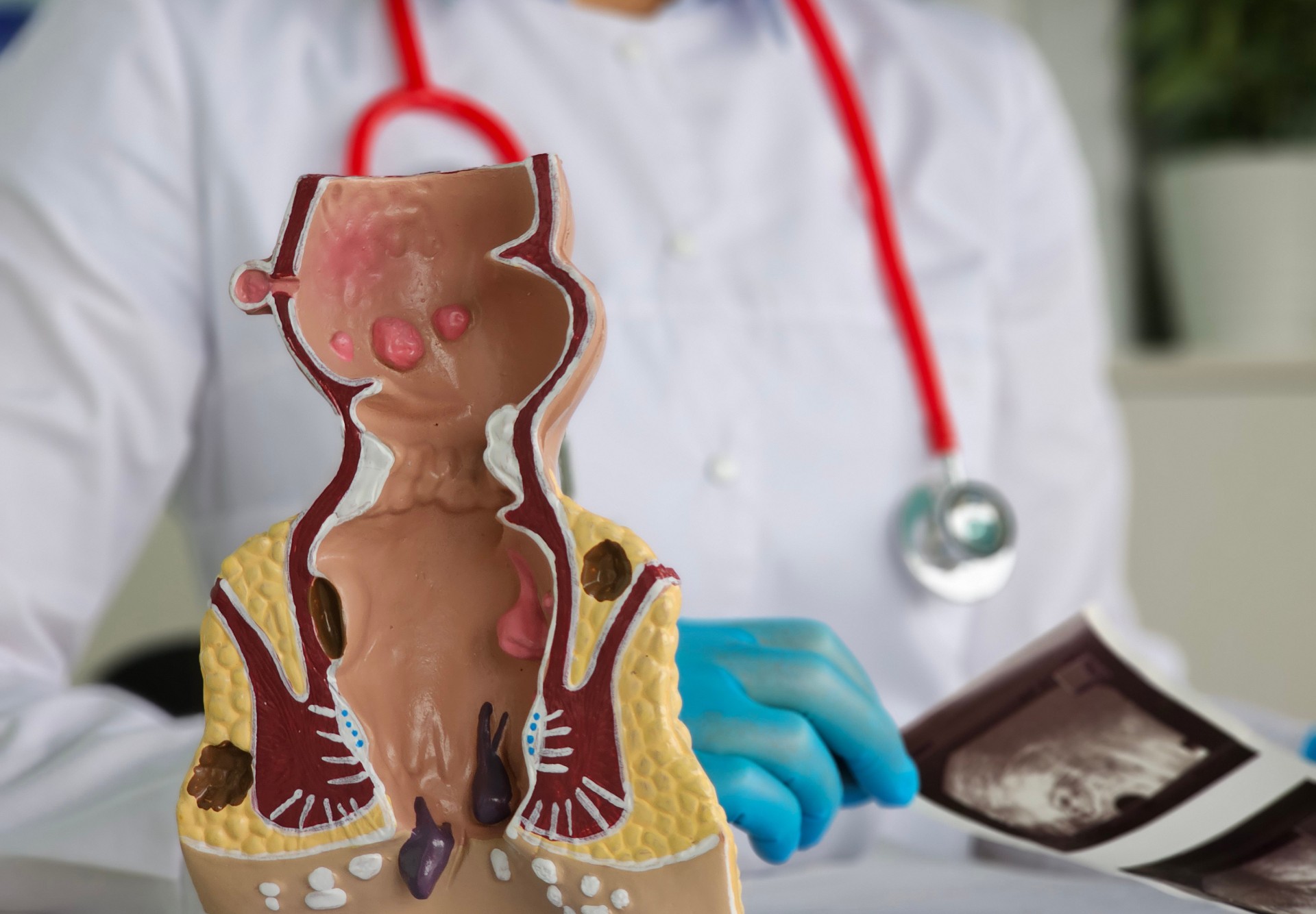Don’t Let Piles Control Your Life — Seek Prompt Treatment For Quick Relief
- Over 25 Years of Experience
- Same Day Appointment
- Minimally Invasive
- Minimal Downtime
- Claimable by Most Insurance*
Types of Piles / Haemorrhoids:
Understanding Your Condition
If you are experiencing any of the following symptoms, it’s important to seek medical attention:
Internal Piles/Haemorrhoids
- Located inside the rectum and are usually painless.
- May cause bleeding during bowel movements.
- In severe cases, they can prolapse (protrude outside the anus).
External Piles/Haemorrhoids
- Found under the skin around the anus.
- Can cause significant pain, swelling, and irritation.
- May develop clots (thrombosed piles), leading to increased discomfort.
Prolapsed Piles/Haemorrhoids
- Occur when internal piles extend outside the anus.
- Can cause pain, itching, and difficulty cleaning the area.
- Often classified into grades based on the extent of prolapse.
Thrombosed Piles/Haemorrhoids
- External piles that have formed blood clots.
- Can cause severe pain, swelling, and a bluish lump near the anus.
Strangulated Piles/Haemorrhoids
- Caused by a prolapsed internal hemorrhoid with restricted blood supply.
- Can lead to intense pain, swelling, and discolouration of hemorrhoid tissue.
- May lead to tissue damage or infection which requires immediate treatment.
Early identification of the type and severity of piles is crucial for effective treatment. Consult Dr Bernard Lim for the right approach to relieving your symptoms and preventing further complications.
Suspect You Could Have Piles/Haemorrhoids? Recognise the common symptoms.
Itching or irritation around the anus
Pain during bowel movements
Bleeding after passing stools
Swelling or lumps near the anus
You May Be More Likely to Develop Piles/Haemorrhoids If:
- You’re frequently constipated or strain during bowel movements: Constipation can lead to increased pressure on the rectal veins, contributing to the development of haemorrhoids.
- You’re pregnant or recently gave birth: Hormonal changes, increased pressure from the growing uterus, and strain during childbirth can all contribute to the formation of piles.
- You lead a sedentary lifestyle or sit for long periods: Sitting for extended periods increases pressure on the rectal area, which can lead to swollen veins.
- You have a low-fiber diet or are overweight: A diet low in fiber can result in constipation, while excess weight places additional strain on the rectum and anus.
- You’re over the age of 50: Age-related changes, including weaker vein walls, can make haemorrhoids more likely to develop.
- You have a family history of haemorrhoids: Genetics can play a role, making you more predisposed to developing piles.
- You regularly lift heavy objects or engage in strenuous physical activity: Lifting heavy weights or intense physical exertion can increase pressure on the abdominal area and rectum, leading to haemorrhoids.
- You have chronic diarrhea: Repeated straining from diarrhea can contribute to the development of haemorrhoids.
Early detection and treatment can prevent complications— don’t wait to seek treatment.
Our Doctor
Meet Dr Bernard Lim
Dr Bernard Lim is a Consultant Colorectal Surgeon and an accredited Console Surgeon for the Da Vinci Robotic Surgical System. He currently serves as President of the College of Surgeons, Singapore (2023–2025) and was formerly Chairman of the Chapter of General Surgeons (2015–2019). A life member of the Endoscopic and Laparoscopic Surgeons of Asia (ELSA), he also served on the Medical Advisory Board at Mount Elizabeth Novena Hospital.
Trained at the Department of Colorectal Surgery at Singapore General Hospital, Dr Bernard has performed hundreds of colon and rectal surgeries using laparoscopic, single-port, and robotic techniques. He received a SingHealth HMDP fellowship to train in minimally invasive surgery at Queen Mary Hospital and has conducted multiple workshops on laparoscopic colorectal procedures. Dr Bernard has trained specialists both locally and regionally, remains a visiting consultant at Changi General Hospital, and has served as an adjunct assistant professor at Duke-NUS Graduate Medical School as well as a clinical lecturer at the National University of Singapore.
Dr Bernard Lim is a Consultant Colorectal Surgeon and an accredited Console Surgeon for the Da Vinci Robotic Surgical System. He currently serves as President of the College of Surgeons, Singapore (2023–2025) and was formerly Chairman of the Chapter of General Surgeons (2015–2019). A life member of the Endoscopic and Laparoscopic Surgeons of Asia (ELSA), he also served on the Medical Advisory Board at Mount Elizabeth Novena Hospital.
Trained at the Department of Colorectal Surgery at Singapore General Hospital, Dr Bernard has performed hundreds of colon and rectal surgeries using laparoscopic, single-port, and robotic techniques. He received a SingHealth HMDP fellowship to train in minimally invasive surgery at Queen Mary Hospital and has conducted multiple workshops on laparoscopic colorectal procedures. Dr Bernard has trained specialists both locally and regionally, remains a visiting consultant at Changi General Hospital, and has served as an adjunct assistant professor at Duke-NUS Graduate Medical School as well as a clinical lecturer at the National University of Singapore.

How Are Piles Diagnosed?
Accurate diagnosis is key to effective treatment. When you visit Dr Bernard Lim, he will assess your condition together with your medical profile.
Dr Lim will ask about your symptoms, lifestyle, and any relevant medical conditions. Common questions include:
- How long have you been experiencing symptoms?
- Do you notice blood in your stool?
- Are you experiencing pain or itching around the anus?
- Have you had a history of constipation or straining during bowel movements?
A gentle external examination will be performed to check for visible signs of hemorrhoids, such as swelling, lumps, or irritation.
Dr Lim may perform a digital rectal exam using a lubricated, gloved finger to check for internal hemorrhoids and rule out other conditions.
For a closer look, a small tube with a light (proctoscope or anoscope) may be inserted into the rectum. This allows Dr Lim to examine internal hemorrhoids and assess their severity.
If there are concerns about rectal bleeding or other digestive issues, a colonoscopy may be recommended to rule out conditions such as colorectal polyps or cancer.
Early diagnosis ensures that you receive the right treatment before symptoms worsen.

When Should You Seek Immediate Medical Attention?
While many piles/haemorrhoids are usually harmless and mainly cause pain or discomfort during bowel movements, some symptoms indicate a need for urgent medical attention:
Excessive Bleeding
Large amounts of bright red blood in the toilet bowl or on toilet paper may signal complications. Seek immediate attention if bleeding continues or is difficult to control.
Severe Pain or Swelling
Sudden, intense pain or noticeable swelling around the anus could mean a thromboid or strangulated hemorrhoid, which requires prompt medical intervention.
Signs Of Infection
Symptoms such as fever, chills, or severe redness and tenderness around the anus can point to an infection. Getting timely treatment can help prevent it from worsening.

What To Expect When You Visit Us
- Consultation: You will have a confidential, one-on-one discussion with Dr Bernard about your symptoms, lifestyle, and medical history.
- Physical Examination: Dr Bernard will also perform a gentle, thorough examination to pinpoint the severity and type of haemorrhoids you have. This can include a visual inspection and possibly an internal check.
- Personalised Treatment Plan: Based on your consultation, you will receive a treatment plan
- Follow-Up Visits: We will schedule follow-up visits to track your progress, address any concerns, and ensure your comfort post-treatment.
Why Choose
Dr Bernard Lim?
Over 25 Years Of Experience
With more than 2 decades in practice, Dr Bernard has extensive experience in the diagnosis and treatment of haemorrhoids/piles.
Compassionate, Patient-Centred Care
Dr Bernard and his team provide a judgement-free space where patient comfort and privacy are top priorities.
Convenient Access
Located in Mount Elizabeth Specialist Centre, we are within walking distance of Novena MRT Station, providing our patients with hassle-free access.
Our Solutions
Personalised Treatment for Piles
The treatment approach for piles depends on the type and severity of the condition. Each procedure differs in length of recovery process, risks and complications, as well as post-operative discomfort.
Lifestyle & Dietary Changes (For Mild Cases)
- Increase fiber intake (fruits, vegetables, whole grains) to soften stools.
- Drink plenty of water to prevent constipation.
- Avoid prolonged sitting or straining during bowel movements.
- Use over-the-counter creams or suppositories for temporary relief.
Minimally Invasive Treatments (For Moderate Cases)
- Sclerotherapy: A chemical injection shrinks the hemorrhoid, reducing symptoms.
- Infrared Coagulation (IRC): Heat is applied to shrink internal haemorrhoids.
Surgical Treatments (For Severe or Persistent Cases)
- Hemorrhoidectomy: Surgical removal of large or prolapsed haemorrhoids.
- Stapled Hemorrhoidopexy: A stapling technique to reposition and reduce blood flow to haemorrhoids.
- Doppler-Guided Hemorrhoidal Artery Ligation (DG-HAL): Uses ultrasound guidance to tie off blood vessels feeding the haemorrhoids.
Consult Dr Bernard Lim to find out which procedure best suits your condition.
Our Insurance Partners



Don’t Suffer in Silence
Don’t let Piles/Haemorrhoids disrupt your life any longer.
Contact Dr. Bernard Lim today to schedule a consultation and learn more about our haemorrhoids treatment options.
Frequently Asked Questions
While piles are generally not life-threatening, they can cause significant discomfort and affect your quality of life. In severe cases, untreated piles can lead to complications such as anaemia (due to chronic bleeding) or strangulation (loss of blood supply to a prolapsed haemorrhoid).
The symptoms can also mimic more serious medical conditions, such as cancer, fissures, fistulas, abscesses, or other issues, so it's important to have a proper evaluation.
Piles are usually diagnosed through a physical examination and, if necessary, additional procedures like a proctoscopy or colonoscopy to rule out other conditions.
No, piles and anal fissures are different conditions. Piles are swollen veins in the rectum or anus, while anal fissures are small tears in the lining of the anal canal. Both may cause pain and bleeding but require different treatments.
Yes, piles can recur if the underlying causes (e.g., constipation, poor diet) are not addressed. Adopting long-term lifestyle changes can help prevent recurrence.
Home remedies like warm sitz baths, using over-the-counter creams, and eating a fibre-rich diet can help alleviate mild piles. However, medical advice is recommended if symptoms persist or worsen.
Piles themselves do not usually cause long-term changes in bowel habits. However, untreated or severe piles may lead to complications that can impact bowel movements.
Be prepared to discuss your symptoms, medical history, and lifestyle habits. Your doctor may also perform a physical examination and recommend tests if needed.